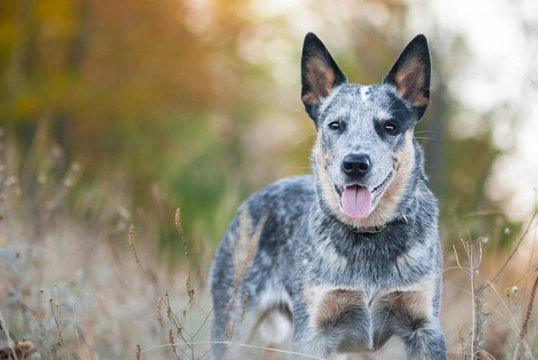
Hereditary cystinuria (dominant) health testing for Australian cattle dogs
The Australian cattle dog is a cattle herding dog and watchdog that can also make for a great pet for active, outdoorsy families that like to spend lots of time walking rambling and generally enjoying the great outdoors with their dogs.
Whilst the breed is most commonly associated with working roles and is not as common in the UK as they are in their home country of Australia, they are beginning to gain traction over here as pets and companions for people who like to stay active and that want to share their homes with an outgoing, friendly and very smart dog.
Dogs of the breed make for great watchdogs and are very loyal to their families, and they’re very intelligent and capable of learning lots of training commands, which means that they are also a great fit for dog owners who want to try their hands at canine sport.
As you might expect, the breed as a whole tends to be hardy and healthy and not prone to suffering from a lot of health problems, but there are a few hereditary health issues that are recognised as being present within the breed as a whole. The relatively small number of unrelated dogs of the breed within the UK that form the foundations of the breeds gene pool also means that such health conditions can easily be spread to an ever-larger number of dogs of the breed if steps are not taken to prevent this.
For this reason, there are a number of hereditary health conditions that can affect the Australian cattle dog and for which DNA testing is available to allow breeders to find out the risk factors for their future litters for several different breed-specific issues.
One such health condition is called cystinuria, and a specific type of hereditary cystinuria has been identified as present within some breed lines of the Australian cattle dog in the UK. The specific form of cystinuria that affects Australian cattle dogs is transmitted by an autosomal dominant mode of heredity, which means that a parent dog with the condition is highly likely to pass it on to their own young.
In this article we will explain what cystinuria is, the type of cystinuria that is a hereditary threat to the Australian cattle dog breed, and how owners of dogs of the breed can get their own dogs tested to find out their status. Read on to learn more.
What is cystinuria in the Australian cattle dog?
Cystinuria is a type of hereditary health disorder that can cause the development of kidney stones, which can be large and serious enough as to block the urinary tract itself, which can prove fatal without prompt treatment.
It is a type of metabolic disorder in which amino acids are not transported properly through the body for elimination and so, that accumulate within the urine to form crystals that can cluster together and form the kidney stones that are the signature of the condition.
Generally, the type of cystinuria that Australian cattle dogs can inherit begins to show symptoms in affected dogs at an early age, usually around the four to six months old mark.
Cystinuria in dogs comes in various different forms in terms of its mode of heredity, and most of these are autosomal recessive conditions, which means that input from both parents is required in order to cause the condition.
However, Australian cattle dog cystinuria is passed from dog to dog as an autosomal dominant condition, which means that the risk factors for a dog with just one parent having the disorder also passing it on to their own young is higher.
How is Australian cattle dog cystinuria passed from dog to dog?
Cystinuria in the Australian cattle dog is a dominant type of cystinuria, which means that it can spread more easily across a breed’s population than is the case for recessive variants of the condition.
This means that any given dog can inherit the dominant gene fault for cystinuria from either just one of their parents or both of them, but even if they only inherit one copy of the faulty gene, they will still be affected with cystinuria due to its dominance.
Dogs that inherit two copies of the gene fault will of course also be affected, and often, more severely than a dog that only inherits one copy of the faulty gene.
When it comes to determining the status of any given dog, they either carry the relevant gene fault or not; and so, are either clear of the condition (because they don’t have the relevant gene fault) or affected by it. This means that there aren’t any carrier dogs who can pass on the gene fault to their pups without being affected by it themselves.
DNA health screening for cystinuria in the Australian cattle dog
Because just one parent dog with the dominant cystinuria gene fault will pass the condition on to their own young, affected dogs should not be used for breeding. You can find out whether or not any Australian cattle dog you are considering breeding from carries the gene fault by asking your vet to take a DNA sample from them and sending it away for testing at an approved laboratory.
Don’t forget that you would also need to get the other dog you are considering using within any given mating match DNA tested too, because it only takes one parent with the gene fault to pass the condition on.
Prospective Australian cattle dog puppy buyers are strongly advised to talk to the breeder in detail about whether or not there have been any presentations of cystinuria in their breed lines, and to ask to see health test results if relevant.



